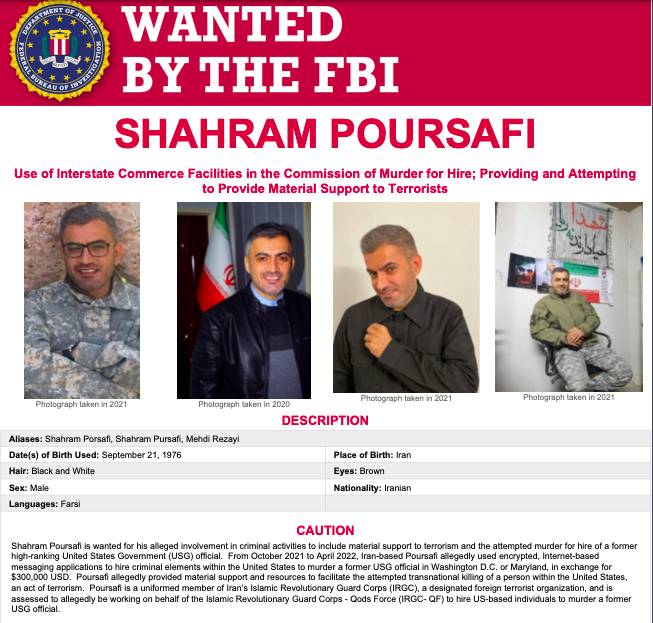FRESH AIR
Bolton and Pompeo assassination plot reveals Iran’s malign intentions and poor capabilities
August 12, 2022 | Oved Lobel

The exposure of a thwarted Islamic Revolutionary Guard Corps – Quds Force (IRGC-QF) plot to assassinate former US National Security Advisor John Bolton and former Secretary of State Mike Pompeo reveals two things about Iran.
First, that Iran continues to try to conduct attacks on American soil, seemingly heedless of any consequences to nuclear negotiations or even US retaliation. This arrogance says nothing good about Iran’s perception of US willpower and deterrence posture. The idea that a successful assassination of a major US public figure wouldn’t derail nuclear negotiations is an extremely dangerous message for the US to risk implicitly broadcasting to the Iranians.
Secondly, that the IRGC-QF’s abysmal tradecraft – partially a consequence of the regime’s desperation and pressure to avenge an ever-growing backlog of assassinated Iranian officials, first and foremost the erstwhile IRGC-QF chief Qassem Soleimani, and partially due to US and Israeli intelligence successes – renders such attacks extremely unlikely to succeed.
It’s clear from this and previous abortive plots that IRGC-QF terrorism, at least in the US, is entirely ad hoc, involving neither concrete plans nor direct involvement. Instead, IRGC operatives or sometimes even their relatives try to hire anonymous third parties, giving them the target and leaving the formation and execution of the plan up to that third party.
This freelancing, of course, leaves them extremely vulnerable to sting operations and betrayal, and means none of their plans have ever come close to fruition. Despite years of failure, Iran still doesn’t seem to understand that almost all, if not all, of its IRGC-QF and intelligence networks appear to be monitored and compromised by both the Israelis and the Americans.
In this case, an alleged IRGC-QF agent, Shahram Poursafi, made contact with some random person he’d met on the internet in the US to conduct surveillance of Bolton. That individual then put him in contact with another unknown individual, who was in fact a “Confidential Human Source” (CHS) of the US Government. Thus, from the second the plot began to be operationalised, it became a US sting operation. It’s unclear how really basic lessons, such as “don’t trust random strangers you meet online,” have still not been absorbed by a supposedly sophisticated terrorist organisation.
In 2011, Mansour Arbabsiar, the cousin of infamous senior IRGC-QF official Abdul Reza Shahlai, thought that because of his business dealings in the US and Mexico, he might know some narcotics traffickers. Shahlai evidently liked the idea and tasked Arbabsiar with recruiting one of them to kidnap then-Saudi Ambassador to the US Adel al-Jubeir, although this later evolved into an assassination plot.
Once again, the improvised, unplanned nature of IRGC-QF operations is clear. Arbabsiar went to Mexico to hire someone he thought was an operative of the Los Zetas cartel. Instead, he hired a CHS working for the US Drug Enforcement Administration (DEA). Like the Bolton assassination, the entire plot was a US sting operation from start to finish, entrapping the IRGC-QF. The DEA CHS was even the one who came up with the idea of bombing the restaurant in Washington, D.C. in the first place, and everything was left up to him. Arbabsiar also allegedly discussed bombing the Saudi and Israeli embassies in Argentina and the Israeli embassy in the US eventually, but given he was speaking to a US agent, that was never going to happen, either.
IRGC-QF bumbling was made even plainer when Khalid Mehdiyev showed up at the house of Iranian dissident activist Masih Alinejad with a loaded AK-47, US $1,100, and two other license plates in his car. He had been hanging out in front of the house and behaving suspiciously for days, including looking through the windows and trying to open the front door. He was arrested for failing to stop at a stop sign and driving on an expired license, and failed to explain the items in his car. Alinejad was the target of a kidnapping plot by Iran’s intelligence ministry (MOIS) that began around June 2020. Here, too, the plot only ever got as far as surveillance before the FBI intervened.
Rather than aiming for sophisticated plots, the exposed plans indicate that the IRGC-QF and MOIS seem to be throwing as many impromptu plots at the wall as they can to see if any stick. While they may eventually succeed by this method, the constant revelations of their failures should be an embarrassment for the Iranian regime.
Of course, it never pays to underestimate one’s adversary, and it’s possible the amateurish nature of the exposed plots does not reflect more sophisticated plans being monitored and foiled outside the justice system. Moreover, aforementioned terrorism failures aside, the Iranians run a very effective and lucrative global criminal network, primarily through Hezbollah, involved in everything from narcotics and weapons trafficking to money laundering. This narco-terrorism nexus could be utilised to conduct attacks.
Nor does the general trend of IRGC failures across the world necessarily mean that it won’t adapt and eventually succeed in a large-scale attack. These failures should not detract from the seriousness and determination of the Iranian regime’s evil intent, and thus the need for constant vigilance. The Iranians, after all, have succeeded in kidnapping or killing dissidents across Europe.
Finally, the US must make it clear to Iran that there will be a severe military response to further attempts to kill former American officials, or anyone else, on US soil. What all these plots have exposed is that Iran does not fear the US or take it at all seriously. This must change.
Tags: Hezbollah, IRGC, Iran, John Bolton, Mike Pompeo, Qassem Soleimani, Terrorism
RELATED ARTICLES

He survived Bondi. Now he’s fighting back: Arsen Ostrovsky addresses AIPAC conference

US Middle East strategy amid regional instability: Dana Stroul at the Sydney Institute





















